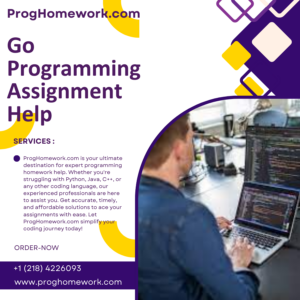Expert Guidance
Go is an adaptable programming language designed to solve many different kinds of issues, from data analysis and machine learning, to editing audio and video files. Go’s flexibility makes for fast development; applications can run as single processes in the background while taking up less RAM space than competing languages; debugging is simple while its wide selection of testing functions provides ample opportunity for discovery and improvement.
Students often struggle to complete coding assignments on their own, particularly complex concepts or due to other academic and extracurricular obligations. Seeking professional assistance may help students improve their grades quickly while developing valuable skills in a timely fashion.
Programming assignment help services offer 24/7 customer support to answer questions and clarify concerns, provide feedback on student Assignments and help develop students’ skills over time, leading to more positive results and an ultimately more prosperous career path.
Efficient Time Management
Students juggling multiple tasks require efficient time management practices. Students in need can turn to Go Programming Assignment Help experts for assistance with coding assignments and homework, so they can focus on subjects essential for their careers.
Go stands out from other languages by its native support for concurrency via channels and the select statement, making it much faster to write code that runs across multiple cores. This feature helps make Go a great candidate for writing multiple-core applications quickly.
Go’s syntax makes it easier for developers to comprehend their code. It features a clear and concise language specification, making Go an invaluable asset when developing maintainable software. Familiarity with design patterns such as Factory Pattern can also greatly facilitate writing clean, maintainable code; Skill one such pattern being the Factory Pattern which enables creating one class which produces identical objects without duplicating code – saving both time and effort during development as well as potentially eliminating bugs caused by duplicate code duplication.
Improved Academic Performance
Many students who choose a career in programming often face academic hurdles. For instance, they may not have enough time or ability to complete assignments due to other commitments; or may find it challenging debugging code errors. Enlisting help with their programming assignments from a reliable service provider could make a real difference in terms of improving grades and meeting academic goals.
Quality Go programming assignment help services offer students customized solutions that fulfill the expectations and guidelines set by their professor and university. This may include detailed analysis, error-free code development and explanations to help students grasp complex concepts more fully.
These services provide expert Guidance, save students’ valuable time by ensuring assignments are submitted on time and correctly, reduce academic stress and allow them to focus on other important aspects of their lives, plus they offer other advantages such as money-back guarantees and 24/7 customer support.
Cost-Effective
Programming assignments require both time and effort, with tight deadlines often pressing. Thus, hiring programming assignment help services can be an economical solution to meeting homework requirements without compromising the quality of your work.
These professional services offer insightful explanations and clear up doubts regarding complex concepts, helping students better grasp them for higher grades. Furthermore, experts also provide guidance in regards to other aspects related to your project and ensure you achieve top marks while enjoying stress-free academic life.
Selecting the ideal Go Kit programming assignment help service is crucial to your success. Read customer reviews and feedback to gain more insight into each provider. Trust Proghomework for their expertise across programming languages, Advantages client expectations, deliverable options, turn around times and competitive prices designed to attract students.





